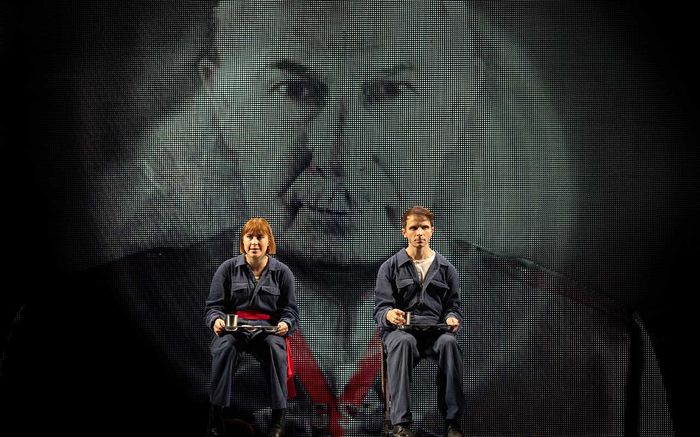
‘It is easy for me to talk to you, we don’t know each other.’
Set in 1944 with bombs and birds audible overhead, Eric (Jaysol Doy) meets Oliver (Rafa Griso Dryer) on a quiet bank by a pond. What follows is mutual curiosity and earnest conversation as these characters, with little in common, find comfort in each other over an impromptu picnic of bread and cherries.
The success of this play has a lot to do with its guise of simplicity. In what could be called a ‘stripped back’ production, Doy and Griso Dryer perform nearly an hour of dialogue sitting in a raised sandbox filled with rocks and gravel; there really is nowhere to hide. It takes immense effort from director Eoin McCaul and assistant director Madeleine Whitmore to bring so much out of what is a very simple concept. It is clear that this is a play that enjoys its own quietness, born out of thoughtful direction. Doy and Griso Dryer give a masterclass in pace, as they find within their characters a tender tentativeness.
“The success of this play has a lot to do with its guise of simplicity”
The play exists between the big and the very small. The backdrop of the war makes this encounter not necessarily one of escape, but a reflection on how we approach a conflict that isn’t directly affecting us. The invasiveness of the occasional plane flying overhead and the sound of distant bombs explains why they turn to each other for comfort, while also keeping the conflict at the play’s forefront.
Oliver is a Quaker and a conscientious objector from Manchester, working on a farm. Eric is an injured artist from Tonbridge and notably honest in his homosexuality — a trait that Oliver admires in him. That said, it almost feels wrong to give this outline, as what the play presents best is that these are two people piecing together a picture of each other as much as you can in a first conversation.
There is still much more to know about these characters. The conversation flows between bread, love, art, religion, education and war as the characters strip back layers of each other, considering each other’s point of view with tolerance, but a new perspective. Being Friends approaches the idea that ‘people are all we’ve got’ with cautious optimism.
Doy and Griso Dryer’s performances are exceptional. Theatrically, this play is nothing more than a single scene, but the pair keep the audience lingering on their every word. The testament to the talent of these actors is found in the art of holding back. They communicate things as much in the stolen glances and nervous blinks as in what they say. The nature of their relationship is unknown, to them as much as us, and while there are suggestions of sexual tension Eric and Oliver do not cross this line, at least for now, (the clue is, of course, in the title). This exploration is fulfilling and the pair find comfort and admiration in each other in different non-romantic ways. This production works because of their strength as a pair of actors, holding each other in a space that allows honesty and vulnerability. As a portrayal of male relationships, it is something very special.
“Theatrically, this play is nothing more than a single scene, but the pair keep the audience lingering on their every word”
Robert Holman’s play holds a magnifying glass up to his characters; you can read more about it in Doy’s article on the underappreciated playwright here. His script is also very funny. The humour is largely in the likeable, odd, unexpected phrasing of Eric. Doy’s clipped delivery does justice to the writing, pulling out a humour that draws Oliver (and us) in, my favourite line being: ‘She lives in Tonbridge. I rent my cottage from her. She’s a lesbian. I like that kind of lady.’
Being Friends makes a conversation between strangers feel both beautifully intimate and strikingly monumental. This production is an excellent example of what happens when a director and actors are perfectly in tune with each other within the bounds of a script that offers so much if you know what to do with it.
 News / Clare Hall spent over £500k opposing busway 24 December 2025
News / Clare Hall spent over £500k opposing busway 24 December 2025 Comment / The ‘class’ of Cambridge24 December 2025
Comment / The ‘class’ of Cambridge24 December 2025 News / Caius mourns its tree-mendous loss23 December 2025
News / Caius mourns its tree-mendous loss23 December 2025 News / Girton JCR publishes open letter expressing solidarity with Palestine25 December 2025
News / Girton JCR publishes open letter expressing solidarity with Palestine25 December 2025 Comment / Yes, I’m brown – but I have more important things to say22 December 2025
Comment / Yes, I’m brown – but I have more important things to say22 December 2025










